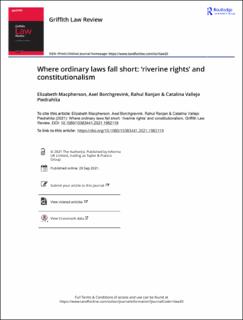Where ordinary laws fall short: ‘riverine rights’ and constitutionalism
Journal article
Published version

Åpne
Permanent lenke
https://hdl.handle.net/11250/2786673Utgivelsesdato
2021Metadata
Vis full innførselSamlinger
- Faculty of Law [2479]
- Registrations from Cristin [9791]
Sammendrag
Laws that recognise rivers and their ecosystems as legal persons or subjects with their own rights, duties and obligations have been associated with theories of environmental constitutionalism. However, the extent to, and manner in which, constitutional law (with its elevated status) has been instrumental in the conferral of these ‘riverine rights’ is still not well-understood. In this article, we consider the constitutional relevance of the recognition of rivers as legal persons or subjects in Aotearoa New Zealand, Colombia and India. We argue that in these three countries riverine rights are constitutional experiments: as small-scale, ad hoc and ultimately incomplete attempts to transcend seemingly ineffective regulatory frameworks for rivers. However, they are also incremental, and influential, steps in a broader project of more fundamental social and environmental reform.
